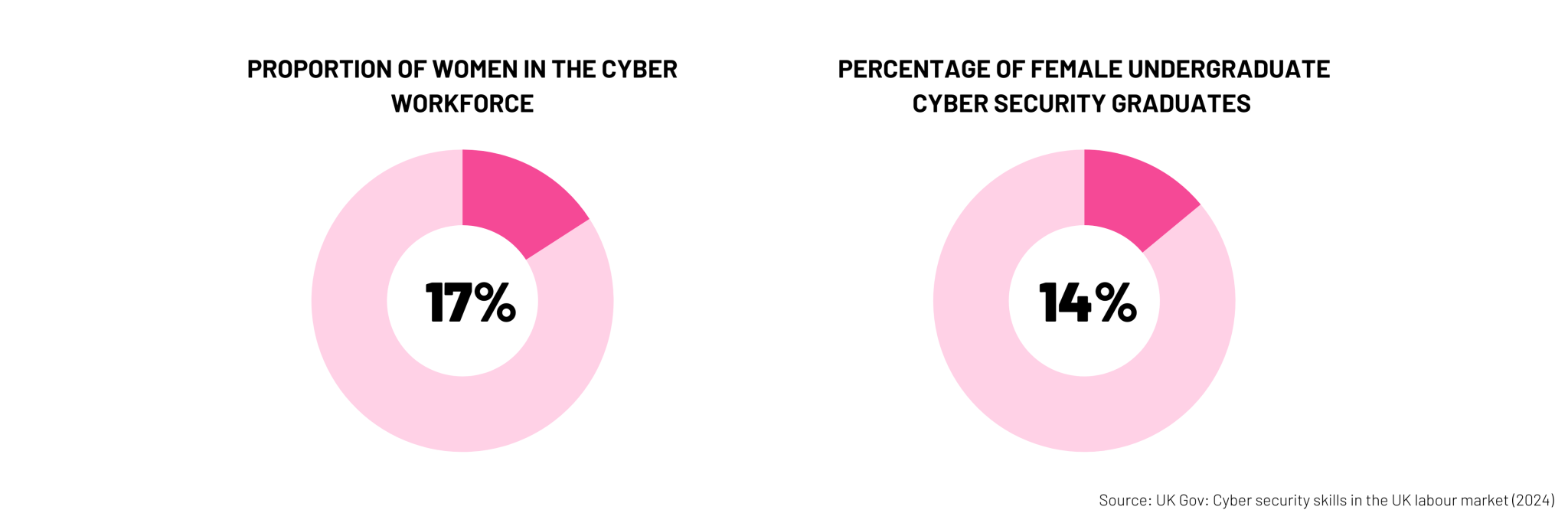
Content Menu
Cyber Skills Shortage: Investing in Cybersecurity Training
Cyber threats are becoming more sophisticated and frequent. Organisations face growing pressure to fill critical cyber roles and train their employees. However, a cyber skills shortage makes this difficult. Demand for experts far exceeds supply, and traditional recruitment methods are not enough.
To bridge the cyber skills gap, companies need alternative pathways. Building pipelines through boot camps and targeted upskilling can help. This blog will explore how cybersecurity training tackles the skills gap while strengthening workforce diversity and resilience.
The Cyber Skills Shortage
A recent UK government report revealed that nearly half of businesses face skills gaps in basic technical areas. In the UK, the shortage is particularly acute, with 53% of companies struggling to fill cybersecurity roles. To address the shortage – IT staff and other employees with little to no cybersecurity experience are being thrown into cyber roles, often without sufficient training. The reliance on informal learning through resources like the National Cyber Security Centre training materials or YouTube tutorials is becoming increasingly common.
Unfortunately, formal cybersecurity training programs are often cost-prohibitive and time-consuming. This leaves organisations unable to provide their teams with the structured, comprehensive education they need to protect against emerging threats.
What's The Risk?
Global cybercrime costs are projected to reach £8.3 trillion annually by 2025, according to Cybersecurity Ventures. In the UK, critical sectors like finance, energy, and defence are increasingly at risk. For example, the average cost of a data breach in the UK has risen to £3.4 million, according to a 2023 report by IBM Security.

Why Employers Should Invest In Cybersecurity Courses
To close the growing skills gap, employers need to rethink how they find and train cybersecurity talent. For example, boot camps and online training programs provide an affordable and accessible way for people without formal qualifications to succeed in cyber roles.
These alternative paths allow candidates to build their skills through practical experience, and have curriculums that can rapidly respond to cyber security requirements in a way that traditional education cannot. Importantly, these programs help bring more diversity into cybersecurity by opening doors for women, and other underrepresented groups.
Why we Need a Diverse Cybersecurity Workforce
However, diversity in cybersecurity isn’t just about fairness—it’s a key driver of innovation and problem-solving. Women make up only 17% of the cyber workforce, and just 15% of cyber professionals come from ethnic minority backgrounds.
A persistent challenge in diversifying the talent pool is the wide gender gap in cybersecurity courses. Only 14% of graduates at the undergraduate level and 24% at the postgraduate level are female. To close the skills gap, the industry must address this educational divide and ensure more inclusive opportunities are available. These alternative cybersecurity courses offer not only a faster route into the profession but also enable employers to build a wider, more diverse talent pool compared to the traditional graduate pipeline.

How Employers Can Invest in a Cybersecurity Training Program
Employers have a crucial role to play in nurturing non-traditional talent and building a more inclusive cybersecurity workforce. One of the most effective ways to do this is by developing entry-level roles and programs that focus on practical, hands-on training. These positions should be designed to accommodate candidates from diverse backgrounds, including those without conventional qualifications.
In addition to entry-level opportunities, businesses need to prioritise continuous upskilling. By offering on-the-job training, certifications, and access to formal programs, employers can ensure their staff have the opportunity to grow and progress within the company. This culture of lifelong learning not only benefits employees but also strengthens the organisation’s overall cyber resilience.
To truly diversify the workforce, companies must also invest in proactive recruitment strategies. This could involve partnering with organisations focused on increasing female and minority representation in tech, attending diversity-focused networking events, and setting measurable goals for recruitment. By doing so, businesses can help ensure that their cybersecurity teams are as diverse as the challenges they face.
The Path Forward: Bridging The Skills Gap with Cybersecurity Training
As the cybersecurity skills gap widens, businesses must look beyond conventional recruitment and training models. By embracing alternative pathways—such as non-degree programs, and on-the-job learning—employers can fill critical skills gaps while enhancing workforce diversity and inclusivity. Ultimately, companies that adopt proactive hiring and training strategies will be better equipped to defend themselves in an increasingly complex cyber landscape.
Get in touch with us to learn how our cybersecurity training can help you bridge the skills gap and diversify your workforce.



















